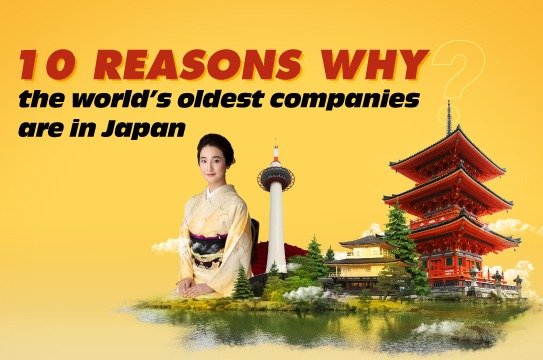Amidst the changing world of business, where new companies come and go quickly, something remarkable is happening in Japan. There are many businesses here that have survived for centuries, passing their traditions from one family to another.
In Japan, there’s a very old construction company named Kongo Gumi. It began in 578 AD. This company is the oldest one in the whole world. Another old business is a hotel that started in 705 AD.
There are many businesses that have been around for a very long time. More than 33,000 businesses are over 100 years old. And there are 3,100 businesses that have existed for 200 years. Some businesses have been around for more than 500 years – about 140 of them! And can you believe it, there are 19 businesses that have been around for over 1,000 years.
What’s interesting is that almost all of these businesses are run by families. This is not common in other places. Normally, businesses don’t last very long, maybe just 20 years. But Japanese businesses are different. They continue to run for centuries without any problems.
How do these Japanese businesses keep going for so long, while others usually don’t last more than a few decades? The answer is in their smart ways of working, deep respect for their culture, and strong values that help them overcome challenges and succeed.
1. A Legacy of Enduring Demand
All businesses are from those fields which are still in demand like construction, games, drinks, food etc.
2. Evolution without Compromise
They adapt to the changes but never change their core competency. For example Nintendo started with the game cards business and now they are in video games.
3. Singular Focus, Singular Success
They don’t diversify themselves in multiple businesses. They still have a single business which started centuries back.
4. Weathering Storms with Reserves
By maintaining substantial cash reserves, they’re able to weather storms like recession or Covid without compromising their operations or integrity.
5. Anchored in Tradition
Respect for cultural heritage and ancestral wisdom runs deep in the veins of these businesses.
6. Values as the Guiding North Star
All businesses have some core values and the businesses run around them.
7. Precision in Process
Process-driven operations ensure consistency, quality, and efficiency, nurturing a culture of excellence that transcends generations.
8. Legacy as Education
They start training their kids from childhood for their business. And They teach them that how important is this legacy
9. A Heir’s Path: Selection
Selecting the next heir is a crucial decision, often based on qualities beyond just bloodlines.
10. Family Legacy Extended: Adopting New Leaders
When the next leader isn’t clear from the family, an adoption process steps in. This ensures that even a non-family member with the right qualities, like Osamu Suzuki, who was adopted into the Suzuki family, can carry forward the business’s legacy and lead the way.
In a world that celebrates the rapid and the new, these businesses stand as beacons of timeless wisdom, reminding us that the past can be the most valuable asset on the path to an enduring future.
Do you think these are good things for a business to do? Would you like to see more businesses follow these ways, even if it means changing how things are usually done? It’s something to think about as we look at the lessons from these remarkable Japanese family businesses.
